Holocaust: tragedy of the Romani people that remains one of the least studied pages of the ІІ World
From the early August to the end of September, the world commemorates innocent people tortured and killed during the Second World War due to the Nazi ethnocide policy. On the 2nd of August, the world commemorated the 80th anniversary of the Romani Genocide. Commemorative events took place in the former death camp, Auschwitz-Birkenau, attended by the high dignitaries, international representatives, and Romani organisations. On the 29th of September, the world is going to commemorate the tragedy of Babyn Yar which, during the German occupation of Kyiv, became the location of mass ethnic-based gunfire executions of Jews and Romanis. The historical truth about the tragic stories of the Romani people has only recently been revealed in full.
«It was only in the mid-1980s that the Romani Genocide was recognised as a crime aimed at the elimination of Romanis as an ethnic group»
On the night of 2nd/3rd of August, 1944 ніч з 2 на 3 серпня 1944, in the Nazi death camp Auschwitz-Birkenau (near Oświęcim in Poland) 2,897 Romanis were exterminated in gas chambers for their ethnic origin. German Nazis then organised the so-called «Gypsy night». In this camp, out of 23,000 Romanis forcefully brought here from 14 countries, over 20,000 have died. By and large, during the genocide, 600,000 to 1,500 Romanis perished in the genocide. In the years of the Second World War, the Nazis were pursuing the racist policy of genocide. Not only did they forcefully remove Romanis from the occupied countries and then burn them down in concentration camps but also exterminated them in forced labour camps, in the encampment places, and during punitive operations. Percentage-wise, Romanis were the ethnic group that has perhaps suffered most from Nazi killings. Only within the modern-day Ukraine, an approximate number of 24,000 Romanis have died. In 1941, in Babyn Yar, 5 Gypsy encampments were gunned down that had been deployed next to Kyiv. The location of mass murders of peaceful Romanis is now within the Babyn Yar National Historical and Memorial Complex where a Romska Kybytka monument has been installed.
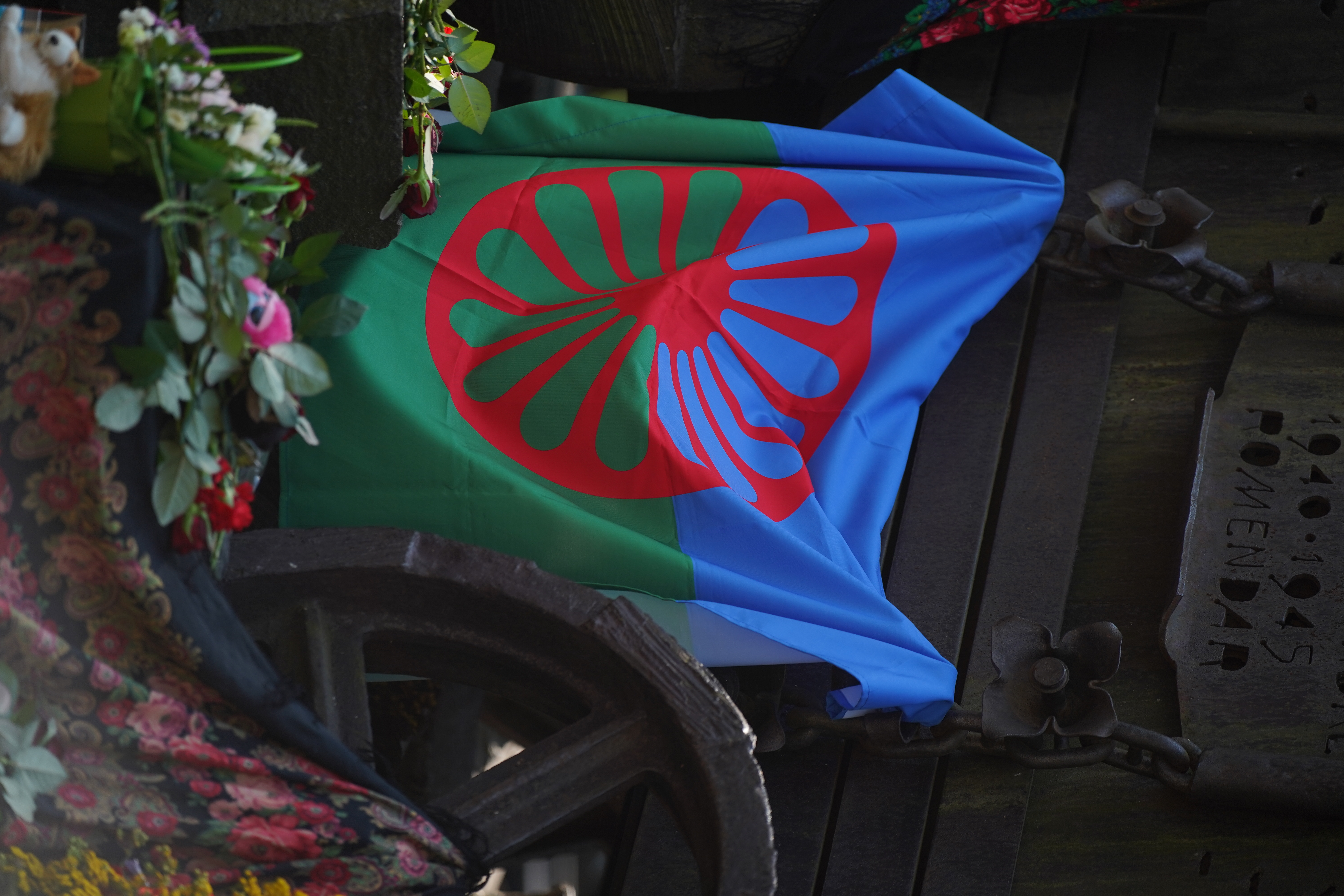
Photo: Roma's Kibitka monument in Babyn Yar
Nazis intended to exterminate Romanis physically—same as Jews. However, for a long period of time, even after Hitler lost the war, the Western community largely overlooked the Romani Genocide—for a number of reasons. Why are the mass murders of Romanis during the Second World War called «the most forgotten genocide» and why is it that this crime against humanity has so far not been widely known? We ask Volodymyr Yakovenko, the Executive Director of Youth Agency for Advocacy of Romani Culture «ARСA». He tells us that murders of Romanis took place all across Europe—Ukraine including.
«They had the nature of mass killings. And the difference is in the fact that in the Central and Western Europe, Romanis were mostly killed in concentration camps whereas in Ukraine and elsewhere in the then-existing Soviet Union, mass murders took place not in ‘established’ concentration camps but simply ‘on site’, wherever they found a Romani settlement, a Romani encampment, a Romani community, there the Romani were just gunned down, inside or outside, on the outskirts of the nearest inhabited locality. And many of those mass murder locations are so far unknown», - says Volodymyr Yakovenko.
Answering to the question of why does the world know so little about the Holocaust of the Romani people, he notes that one of the reasons is the fact that—unlike the Jewish Holocaust—which was recognised right after the Second World War within the Nuremberg Process as a genocide against the Jewish people, the genocide of Romanis has not.
«Many decades had to pass in order for it to be recognised. It was only in the mid-1980s that the Romani Genocide was recognised as a crime aimed at the elimination of Romanis as an ethnic group. Whereas in the Soviet Union and then in Ukraine, these mass executions and mass murder of the Romani population have never been considered something worthy of a public discussion. Same happened to the Jewish population. But the Soviets just ‘piled up’ everyone into a uniform ‘Soviet people’. They only discussed murders of the Soviet people, never focusing on the oppression of Romanis by ethnic origin»,- says Volodymyr Yakovenko.
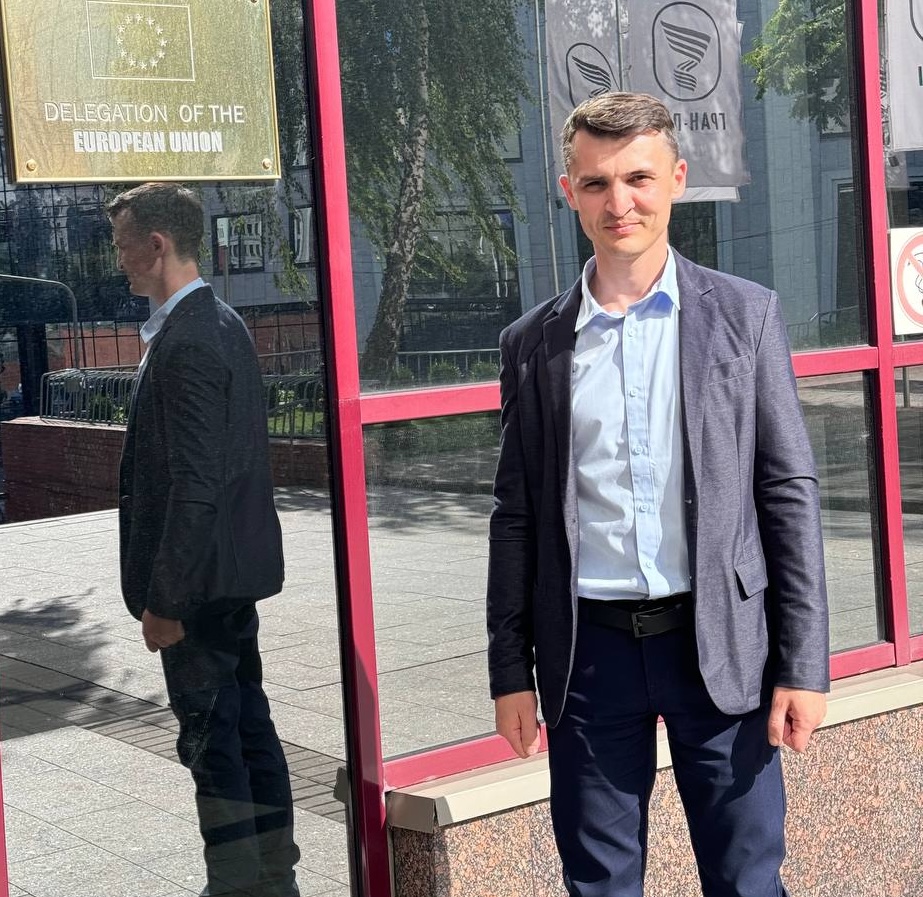
Photo: Volodymyr Yakovenko, Executive Director of ARСA Youth Agency for Romani Culture Advocacy
In 1948, having survived the horrors of the Second World War, the international community teamed up to create a Convention on the Prevention and Punishment of the Crime of Genocide. Thereby, the global community defined the crime of genocide and undertook to prevent it and punish the perpetrators. The International Roma Holocaust Memorial Day is a commemorative date established by virtue of a proclamation by the International Council for Commemoration of Romani Genocide which was established on the 23rd of November, 1996 by the leaders of ten European countries and the United States of America at the conference «Genocide — Memory — Hope» which took place in Auschwitz on the 21st to 23rd of November, 1996. It is commemorated every year on the 2nd of August.
As far as Ukraine is concerned, it was not until our country gained independence that this topic became gradually getting into the mainstream discussion, albeit very slowly, as the memory of the events of the Second World War has been distorted by the Soviet propaganda.
«In the past years, the awareness about the Romani Holocaust has increased substantially»
This year’s commemorative events mark the 80th Anniversary of the Nazi genocide of Romanis which took place in Europe, including Poland and Ukraine. This year, on the 1st of August, an international conference was held in Kraków which was dedicated to the anniversary of the genocide. It was attended by scientists, civil activists, representatives of various governments who all discussed the topic of preservation of the memory of the Romani Genocide, specifically: how can we preserve the information and relay it to the next generations. One of its organisers was the Association of Polish Romanis. Hence, the importance of these events which took place in Kraków and in Auschwitz-Birkenau for the Romani community and for other Romanis and non-Romanis in Poland and Ukraine and elsewhere is something we have talked about with a representative with the Association of the Polish Romanis, director of the Centre of History and culture of Romanis in the city of Oświęcim, Władysław Kwiatkowski.
«This is a long story, as in general, we might say that the first event dedicated to the commemoration of the Romani Holocaust took place back when no one had ever heard about it: in the 1970s. Then, together with the German delegation, in particular, a corresponding memorial was set up within the territory of the Auschwitz-Birkenau museum. Later, the Polish Romani Association worked on the restoration of that monument and was the organiser of the firstmost ceremonies which then took place in the State Museum. In the following years, indeed, one of the most important events was the commemoration of the 50th anniversary of genocide», - noted Władysław Kwiatkowski.
As he says, 80 years ago today, the Romani Genocide happened. And 30 years ago, the Polish Romani Association was founded.
«This awareness of the Romani Holocaust has increased incredibly due to the fact that this year marked the 80th anniversary of it. The events were very well planned. On the 31st of July and on the 1st of August, symbolic commemoration took place in the Crematorium No. 5. On the 1st August, there was a concert and the academic conference in Kraków. On the 2nd of August, a political act took place whereby information about the Romani Holocaust was introduced into the school curriculum in European countries. And then, of course, there was the ceremony itself, and a concert. That was a tremendous event. Let me remind you that, since 2015, this day was recognised by the European Parliament as the International Roma and Sinti Holocaust Memorial Day. However, even before the European Parliament did that, it had been recognised in Poland where the parliament passed a decision to introduce the European Roma Holocaust Commemoration Day. That was really a pivotal event which resonated in the society and was compared to the events 20 years ago when they were telling us about the Holocaust», - stressed Władysław Kwiatkowski.
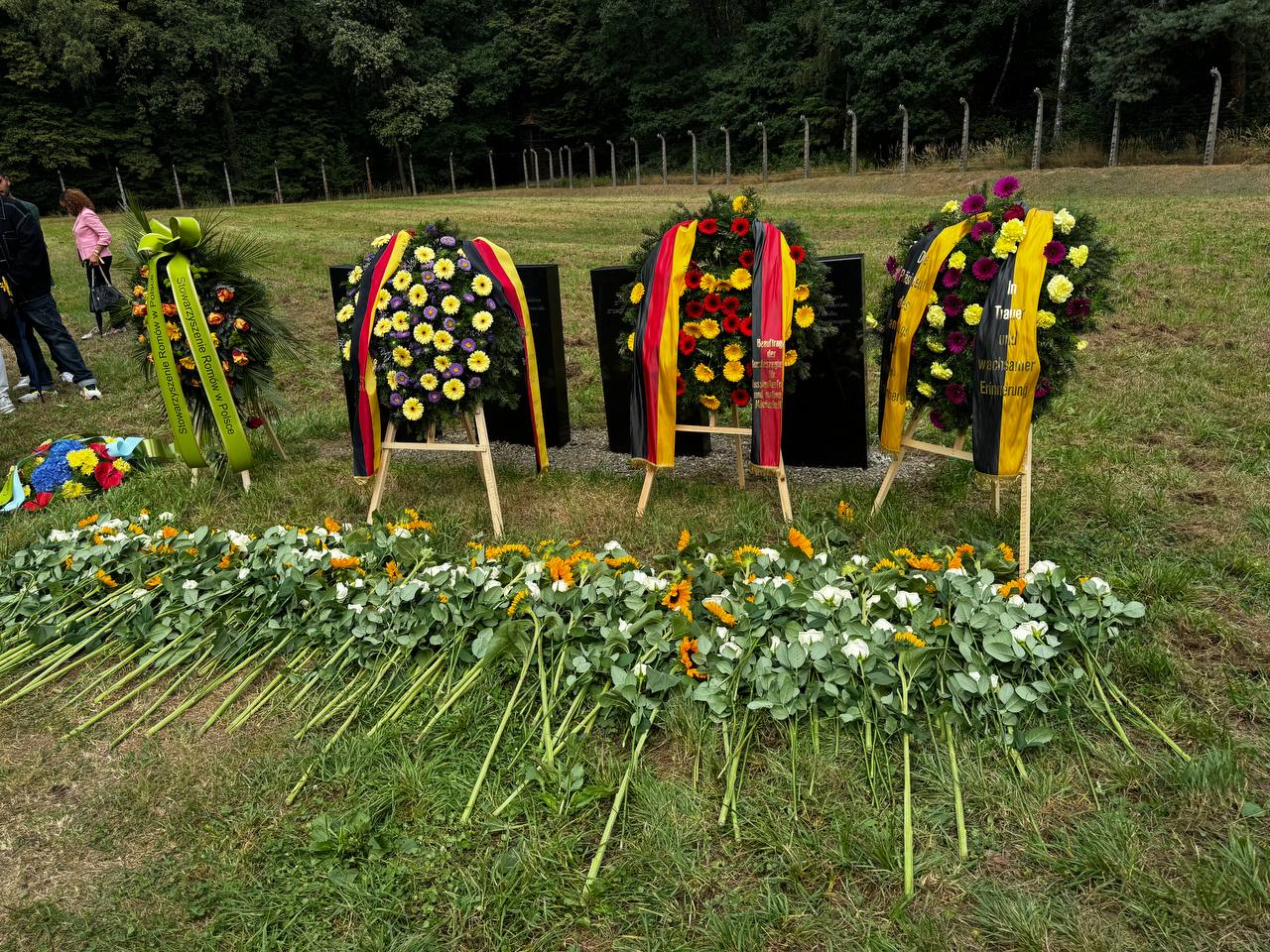
Photo: a ceremony in Auschwitz-Birkenau
This is, in his opinion, a great success.
«I do not know, however, if we can really call this a success but this is, undoubtedly, a pivotal event. I remember the very first ceremony; there were very few young people attending. Today, as we can compare the ceremony 20 years ago and the one today, we shall see that a good deal of work has been done to tell the story of the Holocaust and for the world to see it», - says Władysław Kwiatkowski, representative of the Polish Romani Association, Director of the Centre of Romani History and Culture in the city of Oświęcim.
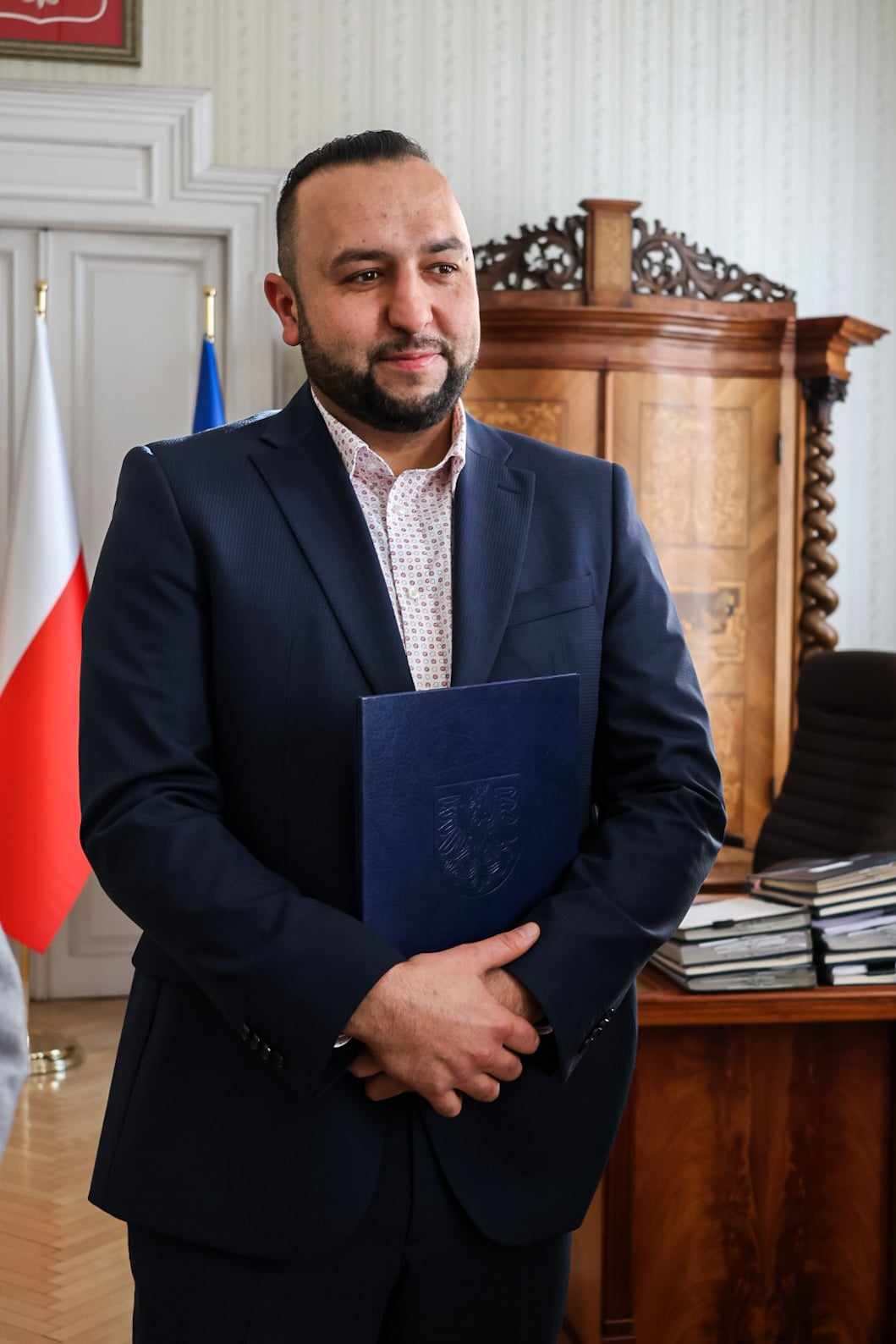
Photo: Władysław Kwiatkowski, representative of the Polish Romani Association, Director of the Centre of Romani History and Culture in the city of Oświęcim
«Earlier in the day, not much attention was paid to the Romani Genocide during the Second World War. Though the Romani Genocide—same as the genocide of Jews—has been taking place for centuries, it was the war that stood out in terms of the number of victims and cruelty»
The Nazis tried to conceal their crime as they blew up the walls of the concentration camp. However, even today, we find personal belongings of victims in the ground. But you cannot conceal the truth about the crime. Every year, a commemorative ceremony takes place in Auschwitz-Birkenau to preserve the memory of those murdered in the camp. The commemorative events are taking place on the 2nd of August—the day of extermination of the Romani population. This year's events were attended by Teodoros Rusopulos, President of the Parliamentary Assembly of the Council of Europe, Bärbel Bas, President of the German Bundestag, Małgorzata Kidawa-Błońska, Speaker of the Polish Senate, as well as other politicians and parliamentarians from various European countries. All of the attending speakers stressed the atrocity of the Nazi crime and talked about modern-day tendencies in societies and how important it is to prevent any kind of discrimination from taking place. Ruslan Stefanchuk, Speaker of Ukrainian Parliament, too, has published his address on the occasion of the Romani Holocaust Memory Day. His statement says that by honouring the memory of those who died in those years, we unite today against the calamity that has once again befallen our common home.
«The inter-ethnic harmony, the unity of the community, the feeling of friendship and common fate is something that fills us with strength, something that helps us resist the Russian invasion and helps us win the war», - said the Speaker of the Ukrainian Parliament.
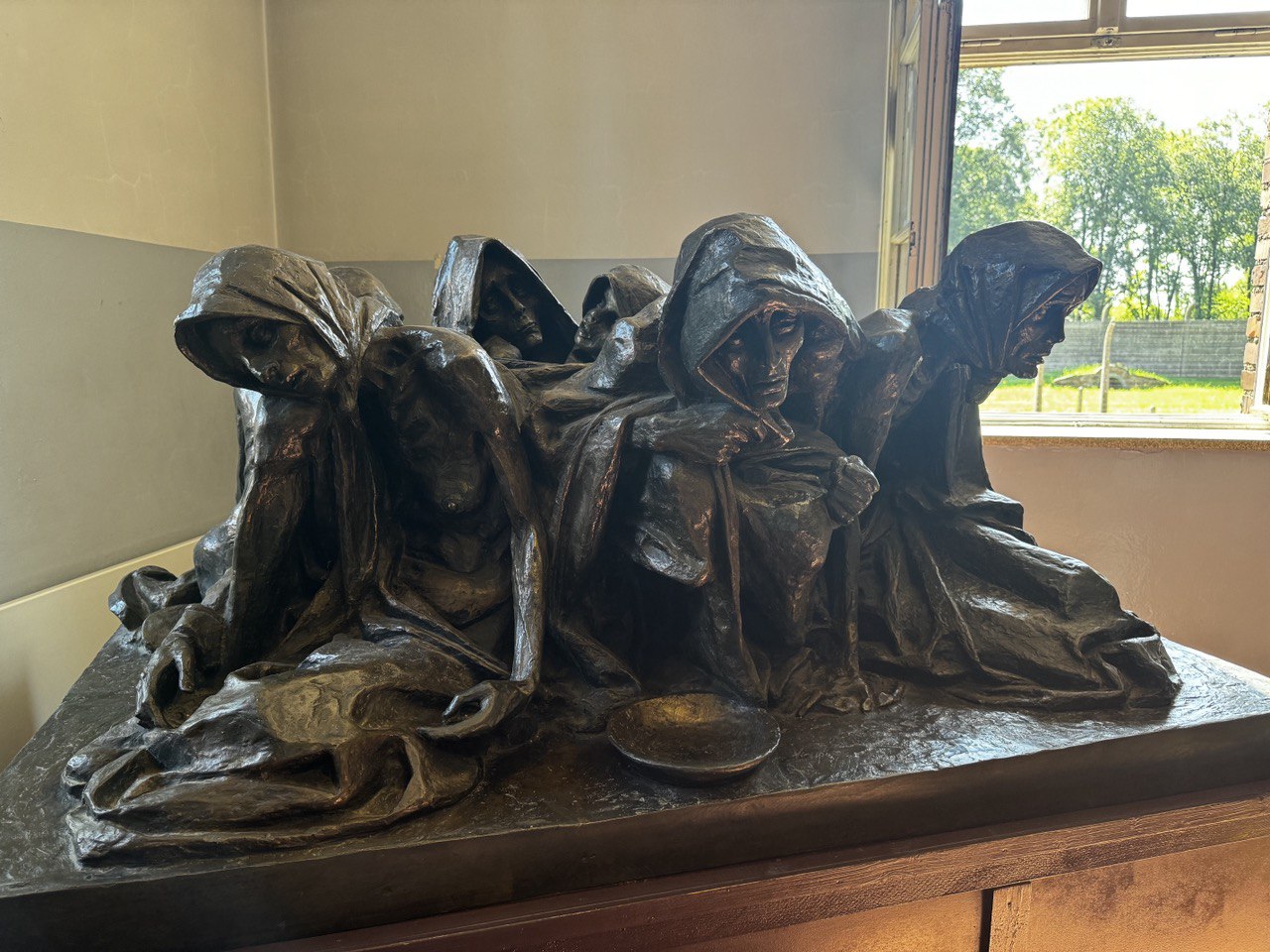
Photo: part of the exhibition in Auschwitz-Birkenau
Another person who paid a visit to the Auschwitz-Birkenau camp and took part in the international conference was Ukrainian MP Yurii Kamelchuk, member of the political committee of the Parliamentary Assembly of the Council of Europe. He shared his impressions on the importance of the events and their organisation.
«By and large, for us, the residents of Ukraine, this was something of a novelty. Earlier in the day, not much attention was paid to the Romani Genocide during the Second World War. Although, as far as I know, the Romani Genocide—same as the genocide of Jews—has been taking place for centuries. The Second World War was just something that stood out in terms of the number of victims and cruelty. But they were banished from everywhere. Earlier, during the conference in Kraków, there was a possibility to find out more about all those problems related to discrimination—which is still there, on the level of many countries. And, judging from what I have heard from ARKA representatives, this is still something that exists in Ukraine—say, as far as getting a job is concerned, or even getting proper health care. There is this attitude towards Romanis that is just not nice. We may discuss reasons for that, we may discuss its sources. But I think that it was part of that underlying propaganda of the Soviet times when Romanis were overall portrayed as indecent people or lazy people or people who do not want to work and live in a civilization and so on and so forth. That, though, is far from true. Hence, when you start investigating the issue and conversing with Romanis, you start to understand that many of them have good education. Part of them consider themselves to be travellers and do not wish to settle down. Many other are well-integrated into society. And there is plenty of Romani abroad, too. They communicate, support each other», - stressed Ukrainian MP Yurii Kamelchuk, ,member of the political committee of the Parliamentary Assembly of the Council of Europe.
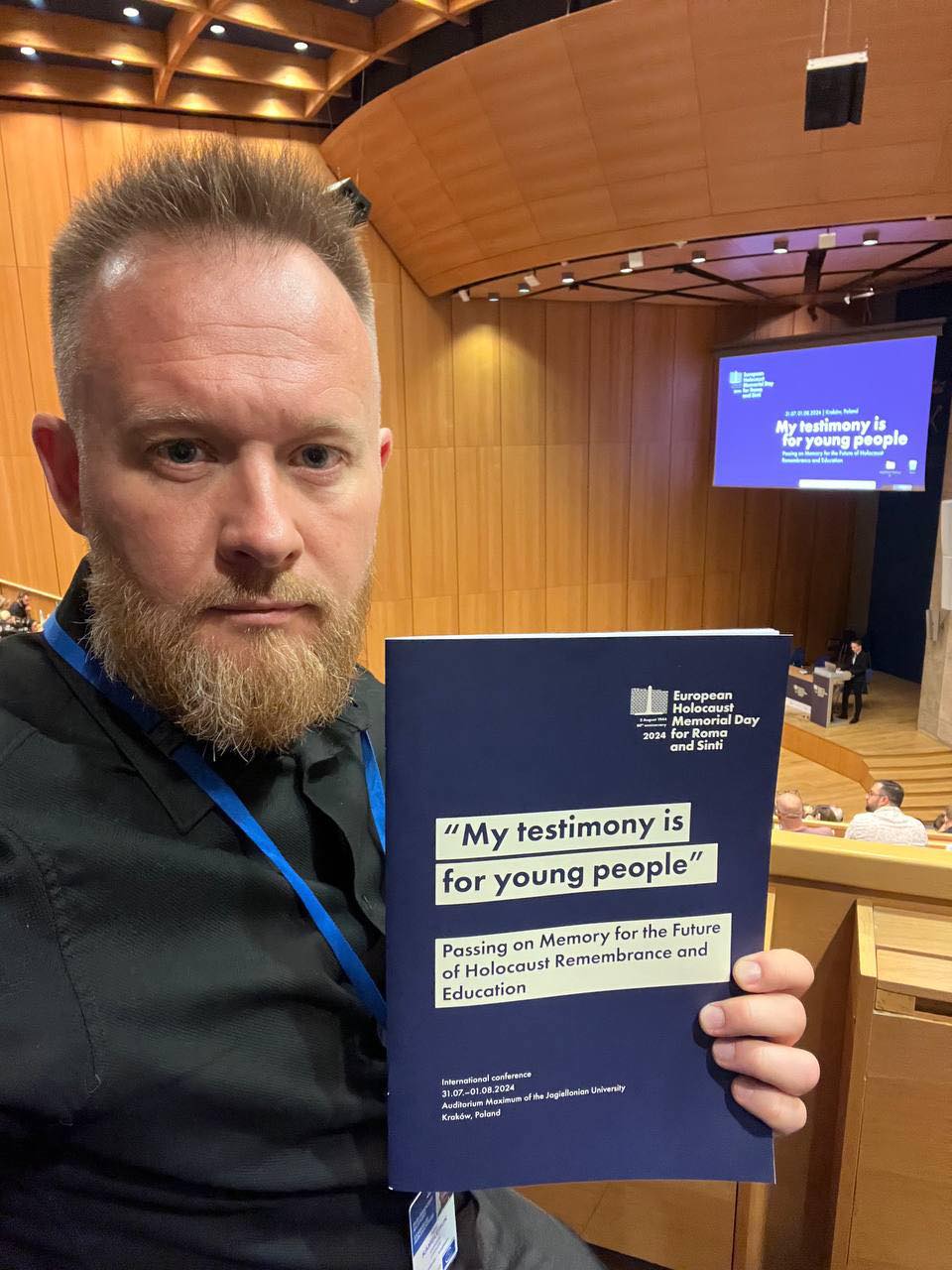
Photo: Ukrainian MP Yurii Kamelchuk, member of the political committee of the Parliamentary Assembly of the Council of Europe
«ARСA» introduced a Ukrainian component into the international conference in Kraków and into commemorative events in Auschwitz-Birkenau»
For 6 years now, since 2018, ARСA Youth Agency for the Advocacy of Romani Culture has been working in the Ukraine’s NGO sector and has put its effort into the development of Romani youth movement, into the cause of supporting and preserving the Romani history and culture, as well as into building intercultural dialogue in Ukraine. ARСA is a co-organiser of international projects dedicated to the Romani genocide. The 80th anniversary of the Romani Genocide has not been an exception. As Natali Tomenko, Deputy Director of ARСA says, the commemorative events help Romanis feel their belonging to the community, as they honour the memory of their ancestors who had suffered from persecutions and genocide. This gives them the boost, the energy for the struggle to live in a world where human rights are the same for everyone.
«For us, it is of paramount importance to cherish the memory of our ancestors who had faced discrimination in the past, as the discrimination has not gone anywhere; it is here with us now. Hence, the memory of those horrible times helps us remind the humanity of the fact that there must be no discrimination—and to fight it. The conference in Kraków which is dedicated to the 80th Anniversary of the Romani Genocide has been attended by dignitaries from multiple countries. ARСA introduced a Ukrainian component into the international conference in Kraków and into commemorative events in Auschwitz-Birkenau. During the conference, I have had a chance to talk about the memory of genocide survivors. Those are elderly people now—and today, they are forced to live through another war taking place in their lifetime. So today, ARСA is recording the testimonies of those people, so that this testimony can be introduced into the historical discourse of the History of Ukraine. This project was initiated in 2023. So far, we have already recorded 10 testimonies. We plan to create a virtual archive where materials will be accessible—not publicly accessible for everyone but for education projects one would be able to submit a request and requests for non-commercial projects will be granted, too. I have had a chance to discuss the importance of this project during the conference. The fact that a vulnerable group like the elderly who have survived the genocide should nowadays be supported by the society. The generation that has survived the genocide will one day pass away. Now, there are already very few elderly people who still remember the event of those days», - says Natali Tomenko.
This is a very important component: the component of education.
«Hence, it is very important for us to record all these testimonies, to transform them into education materials, as do our partners in Europe. But we have a different context here. We should be aware of the fact that the genocide which took place in Ukraine was different from the one that was taking place in Europe’s concentration camps. In Ukraine, Romanis were executed on site. For us, it is most important to create education materials focusing on different groups», - notes Natali Tomenko, Deputy Director of ARСA.
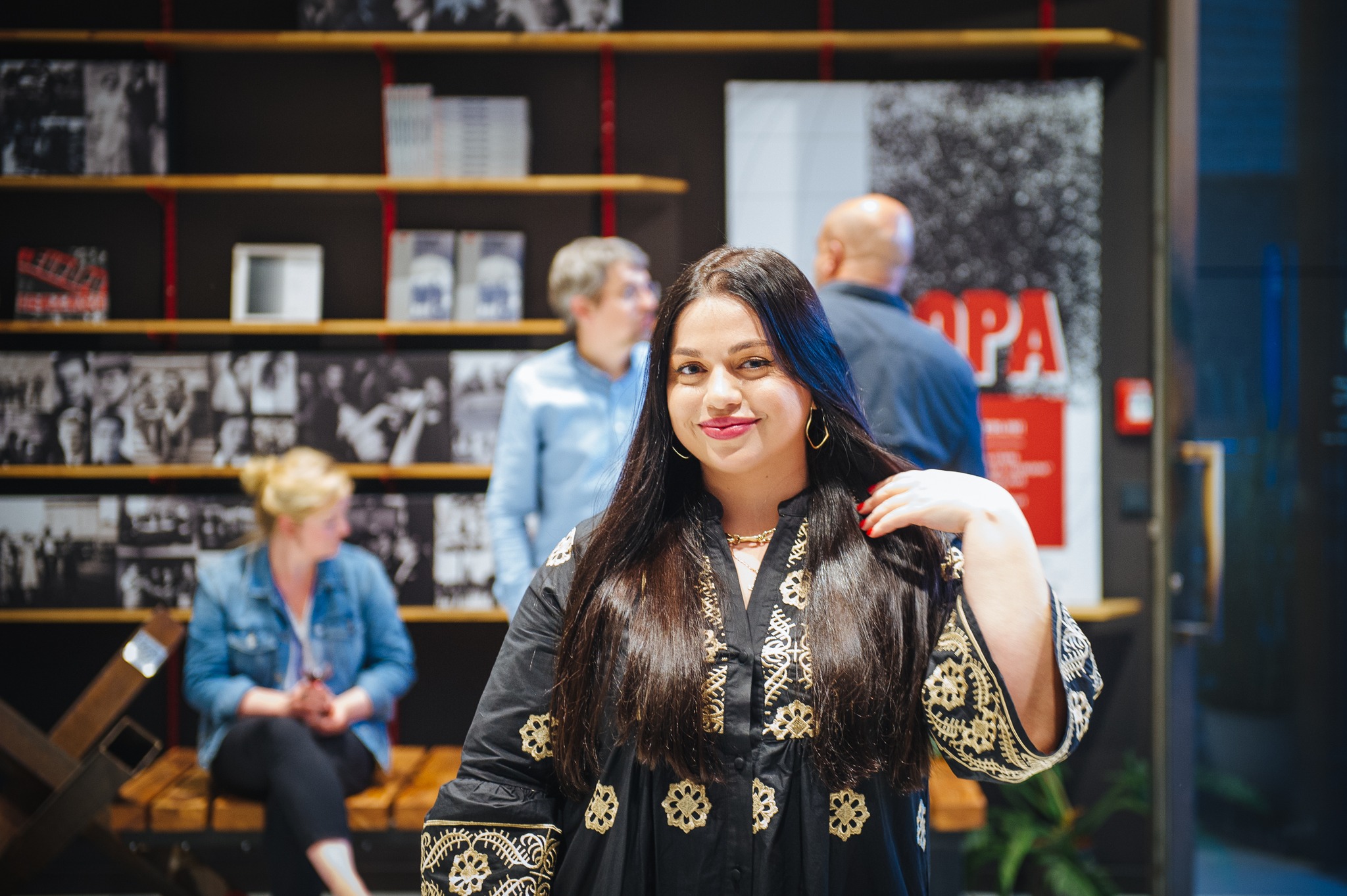
Photo: Natali Tomenko, Deputy Director of ARСA
«Dikh He Na Bister is focused upon young people and is within the education context, so that young people be more aware of the Romani genocide»
The memory of innocent victims who were murdered for the mere fact of being born Romanis was commemorated in the former death camp Auschwitz-Birkenau by the participants of the Dikh He Na Bister education movement. The name means Look and Do Not Forget in the Romani language. This is an annual education event for young people which includes commemorative events in Auschwitz-Birkenau. This initiative aimed ad commemorating the memory of Romani Genocide victims mobilises thousands of Romanis and non-Romanis all around Europe and is aimed at enlightenment and providing information about the Roma and Sinti genocide. This year, DHNB was attended by approximately 380 participants from 32 countries, including: Ukraine, Germany, Hungary, France, Spain, Czech Republic and others.
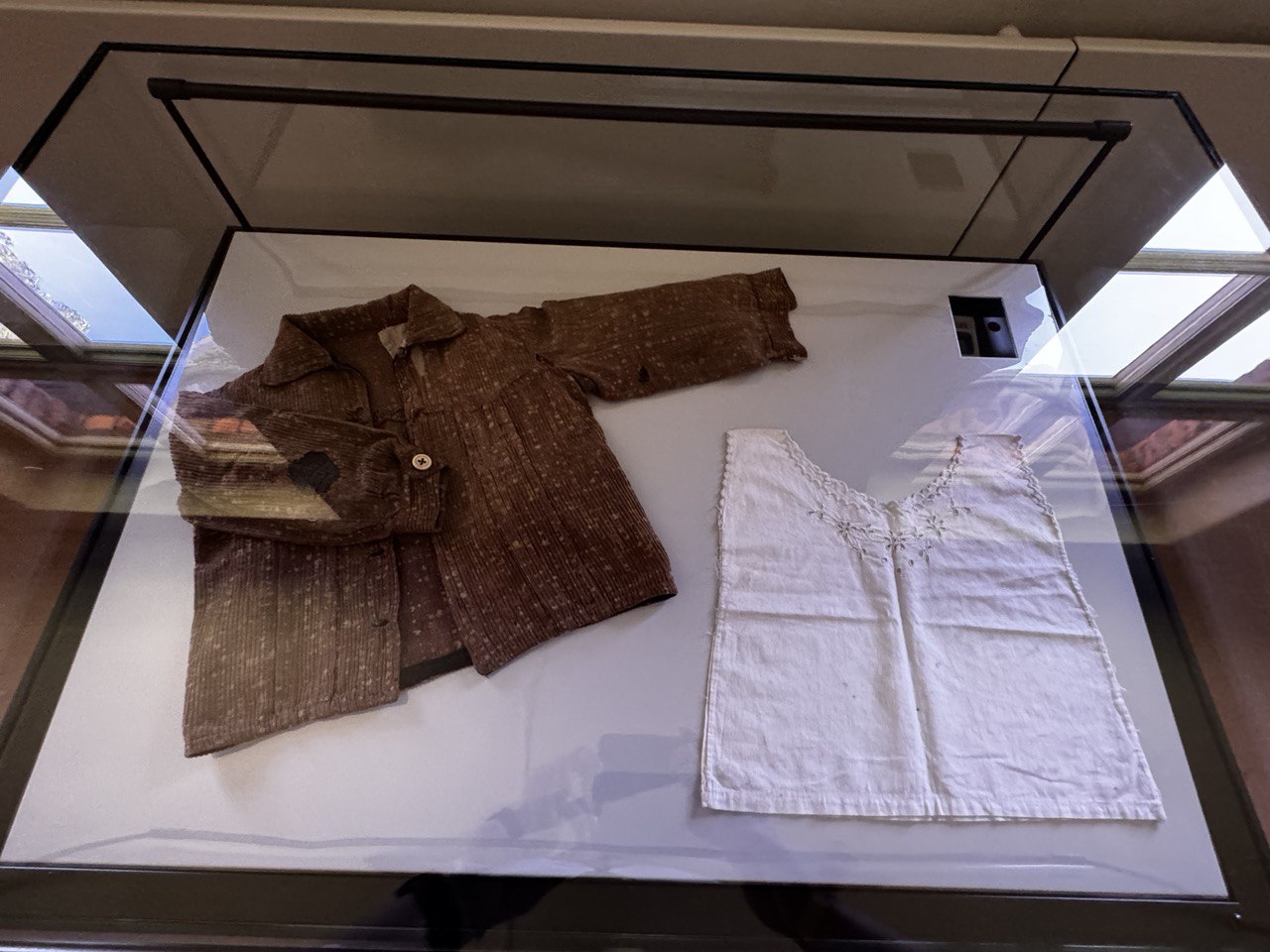
Photo: part of the exhibition in Auschwitz-Birkenau, belongings of child prisoners
Throughout the week, the DHNB team has been visiting education seminars, topical art events, and also went on a tour of Auschwitz-Birkenau to immerse into the topic of Romani genocide and get a grasp of the scope of this crime. This initiative is the organiser of a youth seminar including a dialogue and personal meetings between young people on the one hand and genocide survivors on the other hand. After all, it is this testimony that inspires the participants to combat modern-day challenges including anti-Gypsyism and other forms of racism in Europe.
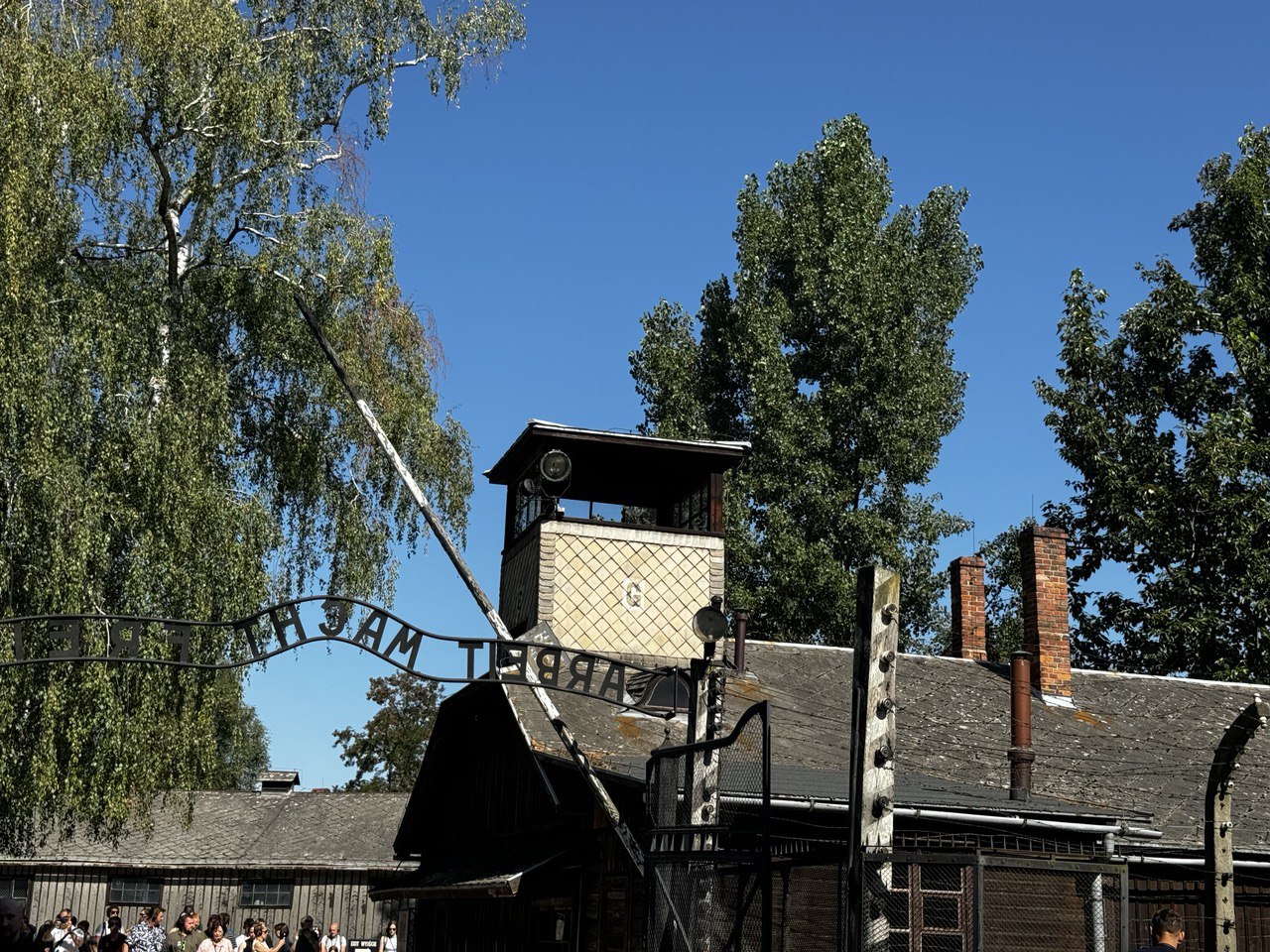
Photo: entrance to Auschwitz
This year, as we commemorated the 80th anniversary of the horrible Nazi crime—the extermination of the Romani population in the concentration camp—the participants of DHNB-2024 were telling the story of how genocide of entire ethnic groups was planned, who was involved, and what can we do today in order to prevent such tragedy from happening again and to preserve the memory about the victims. Here is something Janusz Panchenko, a representative of the Look and Do Not Forget programme (Germany) told us:
«This event has been taking place since 1960. The event itself was launched by a Romani international organisation called “Ternipe”. It is also co-organised by other partner organisations, for instance, Centre of Sinti and Roma in Germany. The Council of Europe is also involved as a co-organiser. The principal part of the event takes place on the 2nd of August. This is due to the fact that precisely on the 2nd of August, 1944, the so-called «Gypsy Night» took place, when almost 3,000 Romanis were exterminated in a single night. Overall, the event lasts a week. But its principal part takes place on the 2nd of August», — says Janusz Panchenko. He adds that the event is specifically focused on youth below the age of 30. «But older people take part, too, as well as non-Romani youth: from Ukraine and other European countries. This event is of educative nature. So it is focused on young people, so that young people find out more about the Romani genocide. Because, unfortunately, even today many young people, including even Romani young people, know very little about the Romani Genocide, or know nothing at all. The genocide itself has only been recognised very recently. As far as the genocide of Jews is concerned, the Jews have done a lot to spread awareness of these tragic events. When it comes to the Romani genocide, though, the Romanis themselves have hardly talked about it, as they have always been severely persecuted in all countries. Even today, the elderly Romanis are rather unwilling to tell the story of the Genocide to their children and grandchildren. So this DHNB-2024 programme’s objective is for the young people to know more about these tragic events», - stresses Janusz Panchenko.
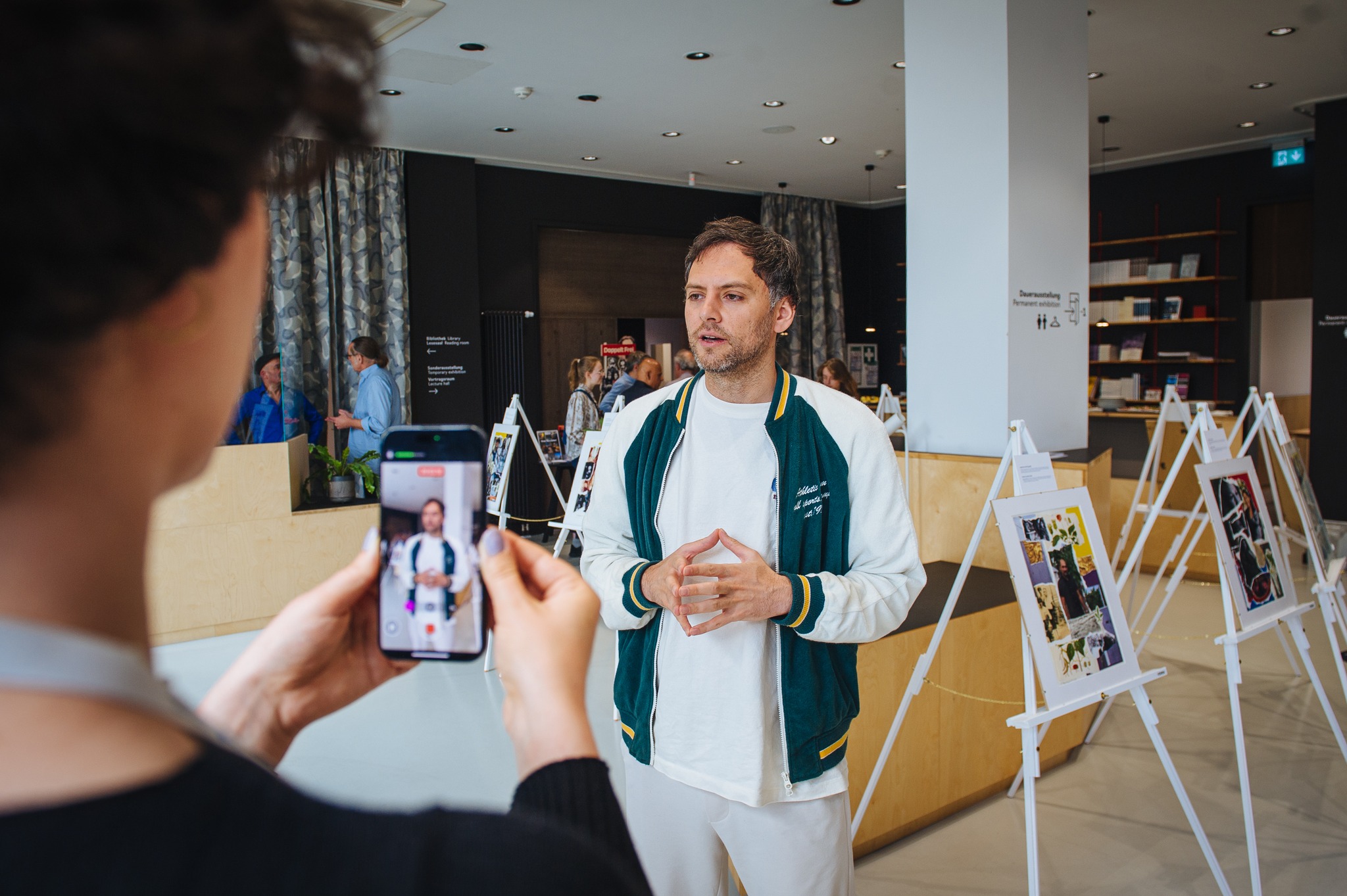
Photo: Janusz Panchenko, participant of the Look and Do Not Forget programme
«Romanis are the integral part of the Ukrainian society, Ukrainian people, so the commemoration of their memory, including information about the complicated historical events pertaining to Romanis in textbooks is of paramount importance»
As per Decree of the Ukrainian Parliament dated 08th of October, 2004. «About International Romani Genocide Day», the International Romani Genocide Memorial Day shall be commemorated on the national level. There is, though, another tragic date. On the 29th of September, the world is going to commemorate the Babyn Yar tragedy. During the German occupation of Kyiv (1941 to 1943), Бабин Яр was the location where the German occupiers mass executed people by ethnic origin: Jews and Romanis. Volodymyr Yakovenko, Executive Director of ARKA Youth Agency for Romani Culture Advocacy, says that there are approximately 60 known locations in Ukraine where Romanis were mass executed by the Nazis. Only known ones! And not every such place even has a commemorative plate.
«Romanis have been living in Ukraine for about 600 years. These are the official data. And Romanis have been experiencing every single event in the Ukrainian history, good or bad, alongside Ukrainians and other nations who have been living in Ukraine throughout history. Romanis have been likewise subjected to the Holodomor, to the civil war tragedies, and to the tragedy of the Second World War. All of the above are parts of Ukraine’s history; hence, all of the above should be in the school textbooks. On these prominent dates, including the 2nd of August, commemorative events should be taking place to honour the Romanis who were exterminated during the Second World War. Romanis are the integral part of the Ukrainian society, Ukrainian people, so the commemoration of their memory, including information about the complicated historical events pertaining to Romanis in textbooks is of paramount importance. Particularly considering the fact that Romanis, same as representatives of other ethnic communities, are likewise defending Ukraine in our Armed Forces. Defending the values upon which our country is founded», - stresses Volodymyr Yakovenko.
From the early August to the late September, Ukraine, together with the entire world, is commemorating the memory of those murdered in the Second World War, the innocent people killed due to Nazi ideology, including Romanis. Commemorative events will also take place in Babyn Yar at the end of September. ARKA is one of the co-organisers of these events.
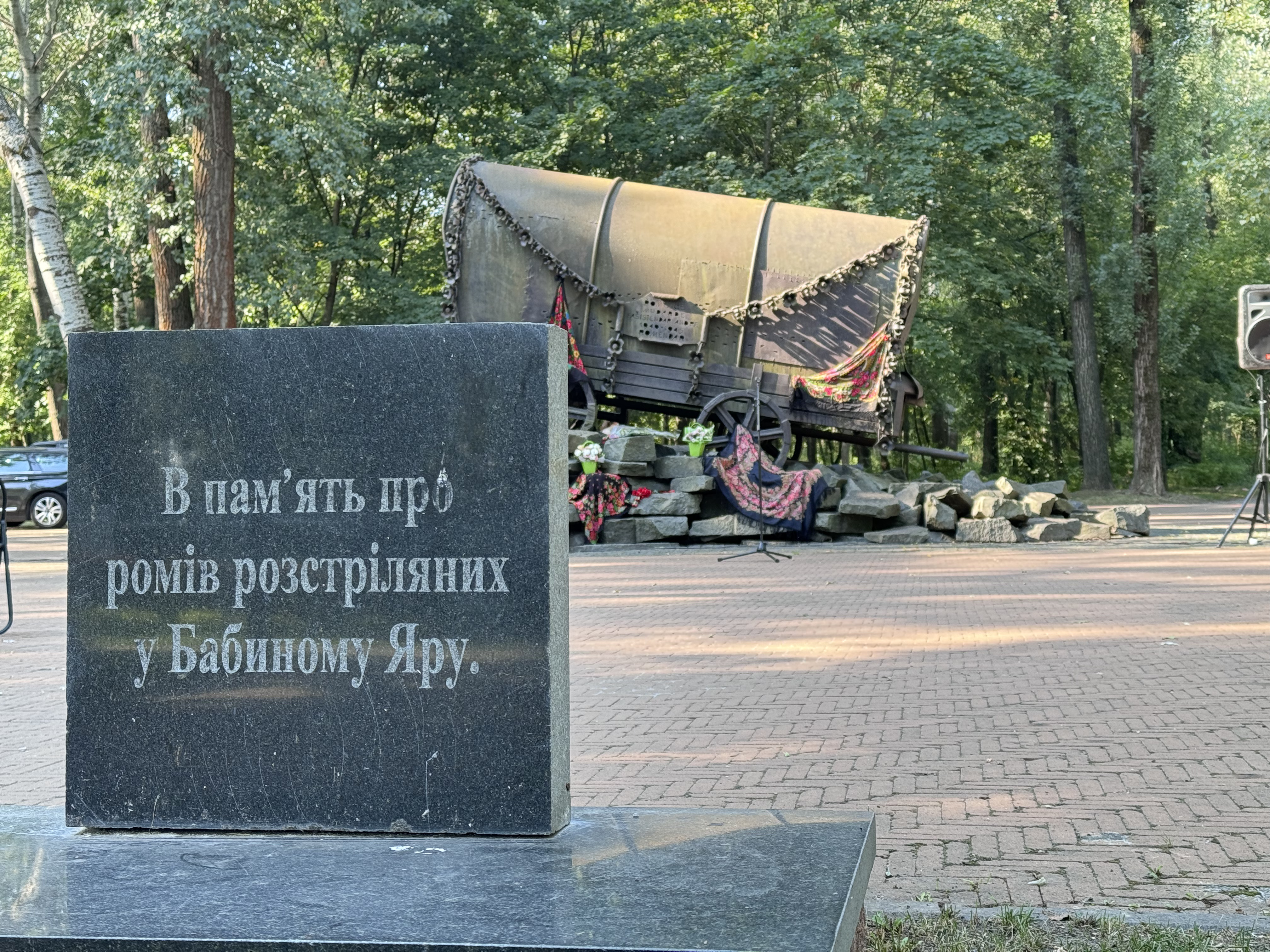
Photo: Babyn Yar memorial
«The civil movement in Europe is more progressive, hence the recognition of the Romani genocide there is on the next level. As Europe has recognised the genocide earlier, today, European countries may well serve as an example for us. The date of the 2nd of August has only recently been introduced in Ukraine. In 2004, Ukraine has recognised the 2nd of August as the International Romani Genocide Day on the national level. Since 2004, there is an official Decree in place mandating the commemoration of Romani victims of the Second World War. Unfortunately, it is not practised in every province, nor even nationwide. This year, however, the State Service for Ethnic Policy and Freedom of Conscience, the Romani NGOs, the Babyn Yar Museum have teamed up for a joint ceremony of commemoration which took place in Babyn Yar and which was attended by representatives of the state authorities and of Romani ethnic minority. There was also declaration by Ukrainian Parliament Speaker Ruslan Stefanchuk wherein he noted the fact that Romanis nowadays, too, defend Ukraine in the Armed Forces, and stressed the importance of multiculturality and mutual respect», - says Volodymyr Yakovenko.
For several years now, on the 29th of September, ARСA conducts an initiative called «Time to remember» wherein they tell the story of Romanis who perished in Babyn Yar, the story of the Romani Genocide, and commemorated the Romanis that were killed.
«This year, too, will not be an exception. There are events scheduled, including events in the Babyn Yar Museum where our art exhibition is presented: children's memories, the memories of Romani Genocide survivors, of Romanis who have survived persecutions but managed to survive» - says ARСA’s Executive Director.
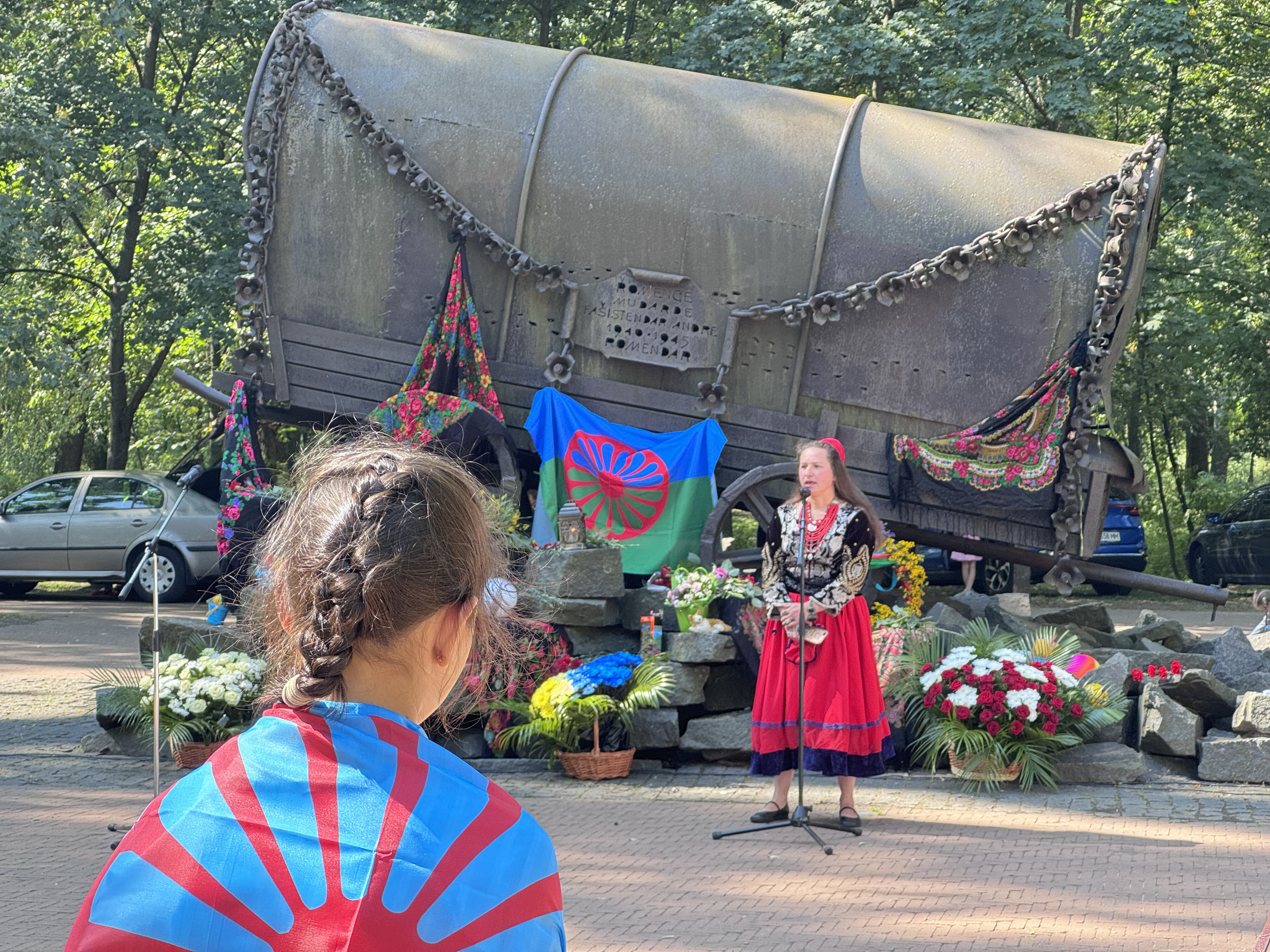
Photo: ceremony in Babyn Yar
What should Ukraine, the Romani community, the Romani NGOs, European organisations do in order for the world to know about the Romani genocide? Mr Yakovenko says that we should remember and analyse the errors of the past.
«One of the names used to denote the Romani genocide in the scientific schools of thought is the «despised genocide». One which has not got the attention it deserves. Nowadays, it is very important to analyse the errors of the past and the tragic pages of history which unite Ukraine and European countries so that these mistakes never happen again. What we saw in Bucha, and other tragedies in modern-day Ukraine which happen during the war, tells us that people fail to learn the lessons of history, they fail to do their homework. Because, had we discussed those errors of the past more, there perhaps would have been fewer such errors, such tragic pages of history today. So I wish our authorities paid more attention to the topic of learning the history of ethnic minorities. And I wish our civil activist to be more initiative in order for this memory about our ancestors be preserved for the upcoming generations», - stresses Volodymyr Yakovenko.
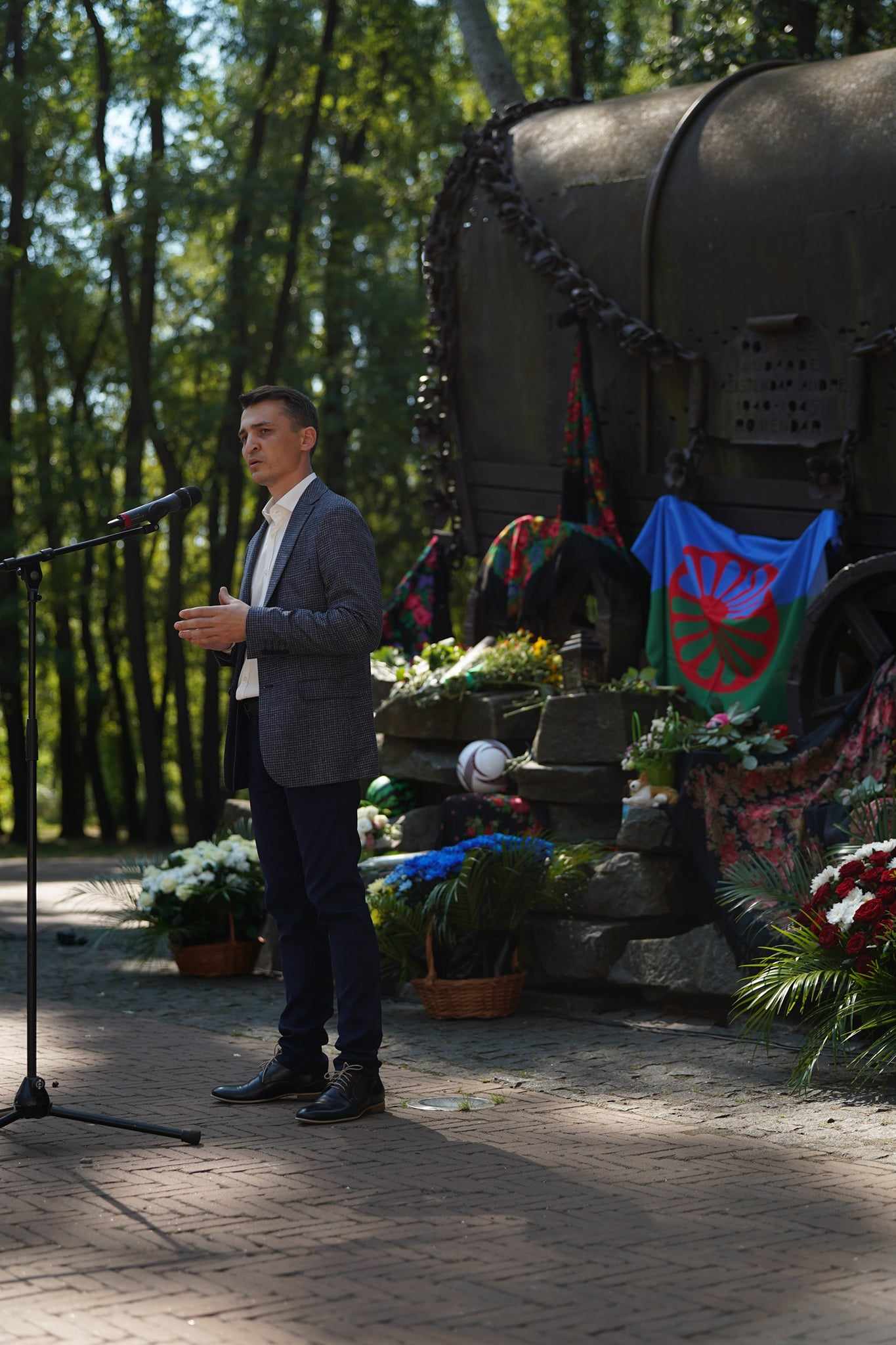
Photo: Volodymyr Yakovenko, Executive Director of ARСA Youth Agency for Romani Culture Advocacy
It should be remembered that Romani ethnonational community is an integral part of Ukrainian nation and that its history, too, is a component of or common history and national memory. The International Romani Genocide Memory Day reminds us of the horrible consequences of hate, racism, and discrimination. Today, the world should join Ukraine, to jointly commemorate the Romani Genocide victims, and to reach inter-ethnic harmony and unity of citizens. This is most important now, as we are fending off the Russian aggression. After all, the extermination of nations and identities was the objective of both Nazi and Stalinist regime then, and is the goal of Kremlin now. The crime which took place 80 years ago and was aimed against the Romani community reminds us how important it is to fight all forms of genocide around the modern world.
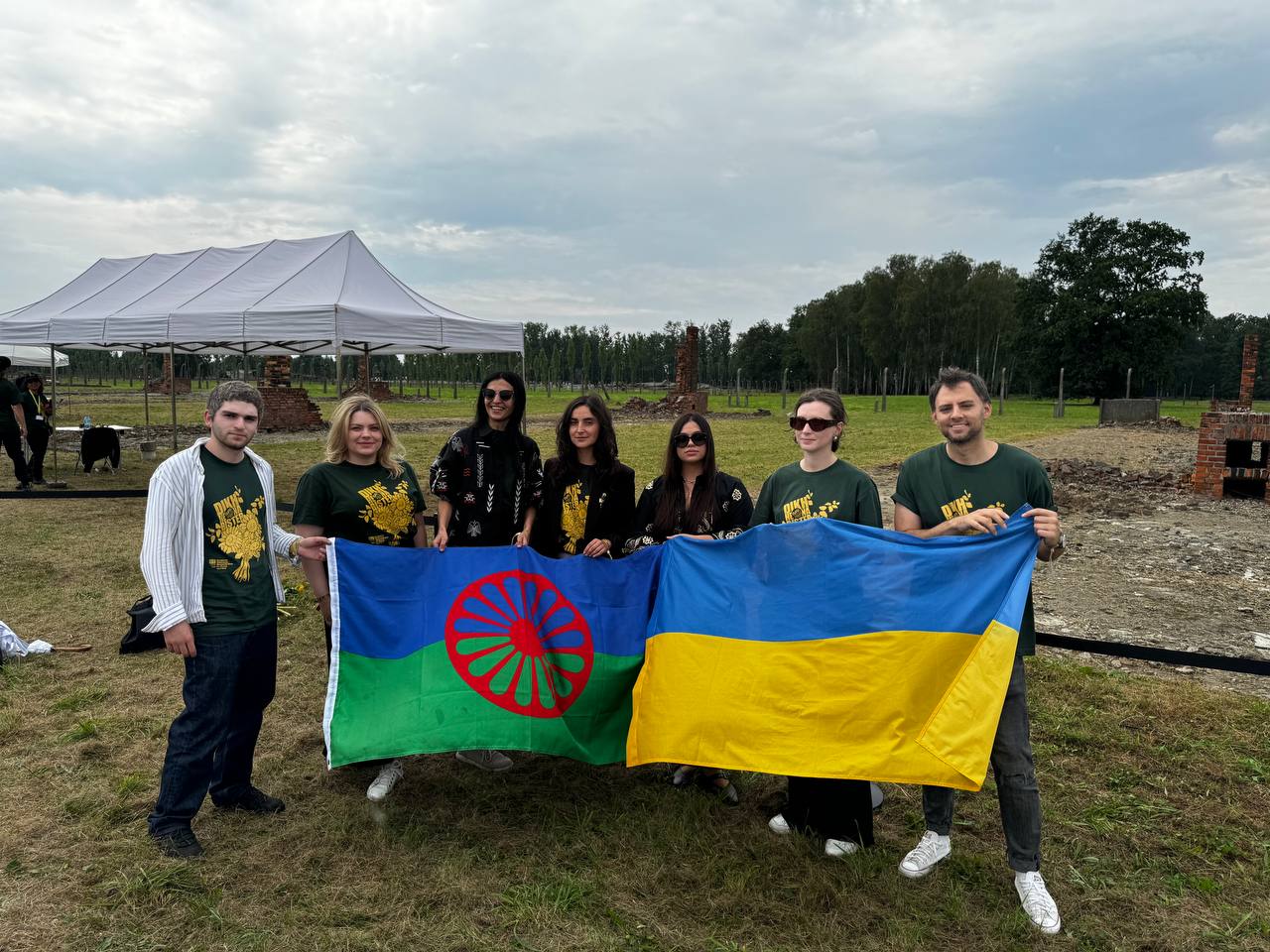
Photo: ARСA representatives at the commemoration ceremony in Auschwitz-Birkenau
This material has been created thanks to the support provided by “Media LifeLine Ukraine”
See also
- Remembering Together: The First Summer School on Roma History in Berlin
- Roma Summer School “Remembering Together” Launches in Berlin
- Empowerment of women, ending discrimination based on place of work and origin: Pathways to Equality
- Look and Do Not Ever Forget: the 80th Anniversary of the Mass Murder of Roma in Auschwitz-Birkenau C
- How to Decolonize Memory?
- Workshop “How to decolonize memory?”
- International event Dikh He Na Bister
- Roma Holocaust Memorial Day
- Roma Civil Society Forum: Video
- The event in Heilderberg, Germany
- A training on the Roma Genocide during World War II.
- The “Collage of Memory and Associations”.
- Art class “Genocide through my eyes”.
- Seminar “Me and Auschwitz”